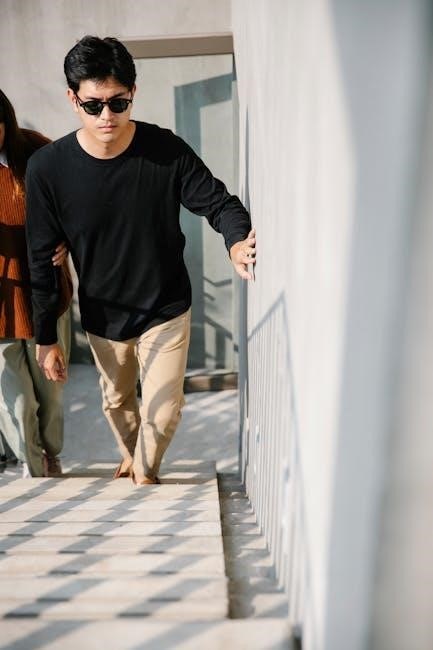Sponsorship is a cornerstone in 12-step programs, offering guidance and support to individuals in recovery. Sponsors provide accountability, helping sponsees navigate the 12 steps effectively towards successful sobriety and personal growth.
What is Sponsorship and Its Importance in 12-Step Programs
Sponsorship is a vital component of 12-step programs, where an experienced individual guides another through the recovery process. A sponsor shares their journey, offering wisdom and support to help the sponsee navigate the steps. This relationship fosters accountability, providing a foundation for long-term sobriety. Sponsorship strengthens the recovery community by creating a network of mutual encouragement and understanding. Studies show that individuals with sponsors experience better program engagement and outcomes. It is a cornerstone of 12-step programs, emphasizing the importance of connection and shared experience in overcoming addiction. Through sponsorship, individuals gain the tools and confidence needed to rebuild their lives and achieve lasting recovery.
Key Responsibilities of a Sponsor in Recovery
A sponsor’s primary role is to guide the sponsee through the 12-step program, offering support and encouragement. They share their recovery experience, providing insight and practical advice. Sponsors help sponsees understand and work through each step, celebrating progress and addressing challenges. They also act as a sounding board for concerns and frustrations. Maintaining confidentiality and being a positive role model are essential. Sponsors encourage accountability and motivate the sponsee to stay committed to their recovery journey. By sharing their wisdom and time, sponsors empower sponsees to achieve sobriety and rebuild their lives. This mentorship fosters personal growth and strengthens the recovery process.
Step 1: Preparing to Be a Sponsor
Preparing to be a sponsor involves reflecting on your recovery journey, staying active in the program, and seeking guidance from experienced sponsors to ensure effectiveness.
Understanding Your Own Recovery Journey
Understanding your own recovery journey is crucial before becoming a sponsor. Reflect on your personal experiences, challenges, and growth within the 12-step program. A sponsor must have a solid grasp of their recovery to guide others effectively. This includes having worked through the steps themselves and maintaining ongoing commitment to sobriety. Your journey serves as a foundation for trust and credibility with your sponsee. Sharing your story and insights can provide comfort and motivation, helping the sponsee relate and stay engaged in their recovery. A sponsor’s personal understanding of the 12-step process ensures they can offer practical advice and emotional support, fostering a meaningful connection and facilitating progress in the sponsee’s journey.
Setting Clear Expectations for the Sponsor-Sponsee Relationship
Setting clear expectations is essential for a healthy and productive sponsor-sponsee relationship. Both parties should discuss and agree upon roles, responsibilities, and boundaries to avoid misunderstandings. Sponsors should clarify their availability and the type of support they can offer, while sponsees should commit to actively engaging in their recovery. Expectations may include regular meetings, communication preferences, and the focus on working through the 12 steps. Establishing mutual respect, confidentiality, and accountability helps build trust. Agreeing on the duration of sponsorship and how to handle challenges ensures a structured and supportive environment. Clear expectations provide a framework for both sponsor and sponsee to navigate their relationship effectively, fostering a focused and goal-oriented partnership in recovery.

Step 2: Finding the Right Sponsee
Finding the right sponsee involves identifying individuals proactive in their recovery journey. Attend meetings, be approachable, and engage with those seeking guidance to foster meaningful connections.
Identifying the Qualities of a Suitable Sponsee
A suitable sponsee demonstrates willingness to engage actively in their recovery journey. They should exhibit honesty, openness, and a readiness to work through the 12 steps. A proactive attitude, coupled with a commitment to growth, is essential. The ideal sponsee is coachable, receptive to feedback, and willing to take direction. They should also show a capacity for vulnerability, sharing their struggles and progress openly. Consistent meeting attendance and a desire to learn are key indicators of readiness. Sponsors should look for individuals who are motivated to change and eager to build a supportive relationship. These qualities ensure a productive and meaningful sponsorship experience, fostering mutual growth and accountability.
Where and How to Find Potential Sponsees
Finding potential sponsees often begins at 12-step meetings, where individuals share their experiences and struggles. Sponsors can identify those who are actively seeking guidance by paying attention to newcomers or those expressing a desire to work the steps. Volunteering for service roles, such as leading meetings or organizing events, increases visibility and approachability. Engaging in one-on-one conversations after meetings can help build connections. Additionally, sponsoring workshops or outreach events provides opportunities to meet individuals in early recovery. Being approachable, open, and willing to share your own journey encourages others to reach out for support.
Step 3: Leading a Sponsee Through the 12 Steps
Guiding a sponsee through the 12 steps requires patience, clarity, and consistent support. Sponsors should explain each step thoroughly, share personal experiences, and encourage reflection and accountability.
How to Guide a Sponsee Through Each of the 12 Steps
Guiding a sponsee through the 12 steps requires a structured and compassionate approach. Begin by taking it one step at a time, ensuring understanding and completion before moving forward. Regular meetings or check-ins help monitor progress and provide ongoing support. Share personal experiences to build trust and relatability, making the process more engaging. Address each step’s practical aspects, such as writing exercises for Step 1, to help sponsees confront their powerlessness. Be sensitive to individual beliefs when discussing spiritual steps like 2 and 3, interpreting them meaningfully. Encourage accountability by setting small goals for each step, fostering a sense of accomplishment. For later steps like making amends, guide sponsees in identifying who to approach and how. Combine education, personal sharing, practical support, and encouragement, balancing guidance with ownership of the recovery journey. Remain patient and available for questions, understanding each sponsee’s unique path. Utilize tools like the Big Book and suggest actions to effectively work through each step, acting as both teacher and mentor for successful recovery.
Providing Support and Accountability
Providing consistent support and accountability is vital in sponsorship. Regular communication, such as meetings or calls, ensures sponsees stay on track with their recovery. Encourage honesty and openness, fostering a safe space for sharing challenges. Sponsors should listen actively and offer guidance without imposing their will. Setting realistic goals and celebrating milestones helps build motivation. Accountability involves gently addressing procrastination or resistance, while also respecting the sponsee’s pace. Offering practical advice, such as suggesting literature or meeting attendance, can reinforce their journey. By balancing support with accountability, sponsors help sponsees stay committed to their recovery, fostering growth and resilience.

Step 4: Handling Common Challenges in Sponsorship
Handling challenges is crucial in sponsorship, as sponsees may face resistance or setbacks. Empathy, experience, and proven strategies help sponsors guide them through difficult times effectively.
Addressing Relapse and Setbacks
Relapse and setbacks are common challenges in sponsorship. Sponsors must approach these situations with empathy and understanding, helping the sponsee identify triggers and underlying issues. It’s crucial to re-establish trust and encourage the sponsee to recommit to the 12-step process. Sponsors should guide them in reassessing their recovery journey, emphasizing accountability without judgment. Open communication and consistent support are vital to help the sponsee regain stability. Sponsors should also remind them that setbacks are opportunities for growth and deeper understanding of their recovery. By fostering resilience and providing practical steps to move forward, sponsors play a key role in helping the sponsee overcome relapse and stay on the path to long-term sobriety.
Navigating Difficult Conversations
Navigating difficult conversations is a critical skill for sponsors. These discussions often arise when addressing relapse, unrealistic expectations, or resistance to the 12-step process. Sponsors should approach such conversations with empathy and clarity, ensuring the sponsee feels heard while maintaining healthy boundaries. Active listening is essential to understand the sponsee’s perspective, followed by gentle yet firm guidance. Sponsors should avoid enabling behaviors and instead encourage accountability and self-reflection. It’s important to stay focused on the sponsee’s recovery goals, offering practical steps to address challenges. By balancing compassion with accountability, sponsors can help the sponsee navigate tough situations and remain committed to their growth and sobriety.

Step 5: Maintaining the Sponsor-Sponsee Relationship
Maintaining the sponsor-sponsee relationship requires ongoing trust, empathy, and respect. Regular communication ensures alignment of goals, fostering accountability while balancing compassion for sustained growth and long-term sobriety.
Building Trust and Communication
Building trust and communication is foundational to a healthy sponsor-sponsee relationship. Sponsors should foster an environment of openness, empathy, and transparency, encouraging honest sharing without judgment. Active listening and consistent availability help establish reliability, while clear boundaries ensure respect and accountability. Regular check-ins and meaningful conversations allow both parties to align on recovery goals and address challenges promptly. Sponsors should model authenticity, sharing their own experiences to inspire trust and connection. By prioritizing effective communication, sponsors empower sponsees to express their struggles and celebrate their progress, creating a strong foundation for lasting recovery and personal growth.
Setting Healthy Boundaries
Setting healthy boundaries is essential for a balanced and effective sponsor-sponsee relationship. Sponsors must define clear limits to protect their own well-being and maintain professionalism. This includes establishing specific times for communication and avoiding over-involvement in the sponsee’s personal life. Boundaries should be communicated early and respectfully, ensuring both parties understand their roles; While flexibility is important, consistency in upholding these limits helps prevent burnout and keeps the focus on recovery. Healthy boundaries also encourage sponsees to take responsibility for their own growth, fostering independence and accountability. By setting and maintaining these guidelines, sponsors create a structured environment that supports both their own sustainability and the sponsee’s progress in the 12-step program.

Step 6: Continuous Learning and Growth for Sponsors
Sponsors must commit to ongoing learning and self-improvement to remain effective. Staying updated on recovery best practices and seeking guidance from experienced sponsors ensures continued growth and impact.
Staying Updated on Sponsorship Best Practices
Staying updated on sponsorship best practices is crucial for effective guidance. Sponsors should regularly attend workshops, read recovery literature, and engage with experienced sponsors to refine their skills. Research shows that sponsors who stay informed about the latest approaches in recovery programs are better equipped to address challenges and provide meaningful support. Additionally, participating in sponsorship groups and online forums can offer fresh insights and strategies. By continuously learning, sponsors ensure they are well-prepared to guide sponsees through the 12-step process, fostering a stronger, more supportive relationship. This commitment to growth not only benefits the sponsee but also enhances the sponsor’s ability to navigate complex situations with wisdom and compassion.
Seeking Guidance from Experienced Sponsors
Seeking guidance from experienced sponsors is a vital part of being an effective sponsor. Reaching out to seasoned sponsors provides valuable insights and strategies for addressing challenges. Experienced sponsors can offer advice on navigating difficult conversations, handling relapse situations, and deepening the sponsor-sponsee relationship. By attending sponsorship workshops, joining online forums, and participating in sponsorship groups, sponsors can gain new perspectives and refine their approach. This continuous learning ensures sponsors stay equipped to guide sponsees effectively. Additionally, seeking mentorship demonstrates a commitment to growth and responsibility, fostering a stronger, more supportive sponsorship dynamic. This practice not only benefits the sponsee but also enhances the sponsor’s ability to navigate recovery challenges with confidence and wisdom.
